
Will 3rd Time be the Charm in Alejandra Bravo’s quest for a seat in Municipal Council?
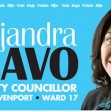
I had a chance to accompany the charismatic Chilean born Toronto resident Alejandra Bravo, who’s currently vying for a seat at Municipal City Council in these elections (fighting District 17 incumbent César Palacio who’s also the only Latin American to sit in Council right now) on one of the nights she went canvassing in the Davenport district— where she also resides. I learned a lot about her ideas and the platform she’s running on, and was also surprised to observe firsthand how she connected with her constituents, speaking to them about the issues that most affect them not only in their own terms but also in their own language. Alejandra is extremely well educated and speaks several languages fluently. Besides English and her native Spanish, she’s fluent in Portuguese, Italian and French. Alejandra also has a long history of community involvement and political activism. This is the third time she runs for the chance to represent her district in City Council. Alejandra tells me she started canvassing from early in the election campaign season, and has walked Davenport many times over talking to voters about what the main issues are for them.
Lea la Versión en Español al Pie de la Página.
1) What has been the feedback or the response of the community in Davenport (District 17) to your quest for a seat at City Council?
This is the third time I run for City Council and it says a lot to voters because they see my commitment to the area and the reality is, people in this area are ready for a change. We’re finding a lot of support amongst people around here. I think the last 4 years under the Ford administration have greatly influenced people’s perception of the changes that they would like to happen. Palacio has been the Councillor for the district for the past 11 years and for the first time he’s close to power. He was a very important member of the Ford administration as a member of the TTC and library boards and people are not happy with him because, really, of the decisions they made– for instance cuts to the most valued services and an increase to public transportation rates while at the same time services were in decline. This has had a damaging effect. Here in our district people are thirsty to find solutions to problems. We definitely have found a lot more support, more volunteers, more donations and a greater appetite for change.
2) Why run against the only other candidate of Latin American background, if you both have so much in common?
I think language and identity are very important, but having a similar political stance is also as important as is the solidarity that one may have to their community. You can’t be voting in municipal council against the services our community needs the most– a community that has challenges finding employment, good education and affordable housing. This is very important to me. This is where I live. I have been active as a member of the executive committee of the Hispanic-Canadian Congress, I helped start the Spanish-Speaking Education Network, I created a training program to emerging community leaders and a civic literacy campaign. I work with ground-roots community organizations. I also think the manner in which you handle power and open doors and give a hand to emerging leaders is very important. That’s why we have so much support in this area, because I’ve fought alongside people in their struggles. This is what they need and want, and solidarity is something very important.
3) As a Latin-American female community leader, how do you establish a balance to work with and for the rest of the people in your district who are not Latin-American immigrants?
What’s good for a Latin American immigrant is good for all immigrants and is subsequently good for all of us. Half of the Toronto population was born outside of Canada. The most fundamental issues in my district are unemployment, public transit and low salaries. I think it’s precisely the fact that I am someone who has the same life experience, to come to Canada, to see your own parents struggle to adapt– my father literally lost his voice because he didn’t speak English– and try to find a decent way to make a living and to have a sense of belonging. This was all very difficult for me, even though I came to Canada as a child, and I keep that experience very close to my heart. This is why I try to help those in need and I also try to work with community agencies that offer help to our community.
4) Is it then your mission to come to City Council to represent your district and be a voice for all immigrants?
In the last 4 years the topic of unemployment has rarely been talked about (in City Council). All those downtown developments, who have they benefitted? For instance, if we had demanded that a percentage of those condo towers were for affordable housing, we could have contributed thousands of units for people who have been waiting forever to find dignified and affordable housing. My greatest passion is this: the municipality has tools and powers they’re not currently using to speed up the process of not just finding a job, but a career so that young people can start a family. I have actively participated in the process of obtaining an agreement with Metrolinx to build the Eglinton Cross Town line. If Metrolinx agrees to give priority to young people who are currently unemployed so they can obtain a position as apprentices, that could be a very rewarding career. It could be a career where you could make a very decent living. There’s a 20 something percent rate of unemployment amongst young people today. Imagine if we could– and I know we can– begin to look at city contracts and purchase agreements. We can see that as a means of employment, of job opportunities for our community. There’s a lot of qualified people and we would give priority to those who live in Toronto.
5) Why doesn’t the immigrant population get more involved in the political process? Why is it important that Latinos seek ways to become part of the Canadian political process– at least at the municipal level, for starters?
I think in these elections there’s a higher number of candidates of immigrant backgrounds running for council. It’s really hard because sometimes the councillors of areas where there’s a larger concentration of immigrants are not as dynamic to get them involved in the process. This is a touchy subject– the lack of knowledge on how municipal council works. There are people who were born and raised in Toronto who don’t know how municipal council works either. It’s very different from parliament, from politics at the provincial or federal levels. Also, because there are no party politics at the municipal level, it’s hard to understand what it is that we have to offer. That’s why we’ve tried to be very clear: this is a campaign to raise the ground for people in our area, and that’s why we’ve concentrated on the topics of jobs, public transit, libraries– the tools people need to better themselves, and I think that’s what’s been lacking in the political discourse. I want to put an end to the Ford era. I think it’s not just the issues of drug use, but also their association with criminal elements– all things not part of the reality of our communities. They’ve damaged the government’s image and people are disillusioned because of everything they promised– better services, less taxes and the reality was quite different.
6) Why the apathy of the general population when it comes to the political process? This time around, however, participation seems to be on the increase.
A lot of people voted in advanced polls. I think that’s indicative that something is changing. But we can’t be naive and dismiss the fact that the political discourse of the Fords is still alive today and it will characterize the political debates in the form of not talking about the connection between what services are provided and how much people pay in taxes. If Doug Ford wins, he won’t have that much support in Council to push his own agenda and he will have a hard time convincing the rest of the members of council. It’ll be one vote against 44 people with their own votes. Decisions will have to be made based on the leadership qualities of all the members of council.
1) Cual ha sido el feedback o la respuesta de la comunidad en el Distrito 17 a tu lanzamiento como candidata de este Distrito en el Concejo Municipal?
Siendo la tercera vez que lanzo la candidatura, eso cuenta mucho porque la gente ve que uno está comprometida con el área y en realidad la gente está como que quiere un cambio aqui. Ahora estamos encontrando gente que nos apoya por todas partes. Yo creo que los últimos 4 años con Ford han influenciado mucho la percepción que tiene la gente de los cambios que quiere ver. Palacio tiene 11 años de ser el Concejal del área y es la primera vez que está tan cerca del poder y fue un miembro muy importante de la administración de Ford en el sentido de estar en el comité ejecutivo del TTC y del comité de la biblioteca y la gente no está feliz, en realidad, con las decisiones que tomaron como por ejemplo hacer recortes a los servicios que son más valorados y a la misma vez incrementar la tarifa del transporte público mientras que el servicio empeoraba. Eso afecta mucho. Aquí en nuestro distrito la gente quiere ver soluciones a los problemas. Definitivamente esta vez tenemos mucho más apoyo, más voluntarios, más donaciones, más apetito de cambio.
2) Porque lanzarse en contra del único candidato Latino, algo que ambos tienen en común?
Yo creo que es importante el idioma y la identidad pero también es importante la posición política, la solidaridad que uno tenga con la comunidad. Uno no puede estar votando en la cámara municipal en contra de los mismos servicios que más necesitan una comunidad inmigrante como la nuestra en donde tenemos desafíos de desempleo, de educación, de vivienda. Eso para mi es muy importante. Aquí es donde yo vivo. Yo he participado como miembro del ejecutivo del Congreso Hispano-Canadiense, ayudé a fundar el Spanish-Speaking Education Network, creé un programa de capacitación de líderes de la comunidad, un programa de alfabetización cívica. Yo trabajo más en la base con la comunidad. Yo creo que también como uno ejerce el poder y como uno abre una puerta para que emerjan más líderes es muy importante. En esta área tenemos mucho apoyo por eso mismo, porque yo he estado con la gente en sus luchas. Esas son las cosas que la gente quiere y necesita, y la solidaridad es lo más importante.
3) Como establece un balance en ser vista como una Lider Latina sin que eso la aliene del resto de la comunidad del distrito 17.
Lo que es bueno para el Latino es bueno para el inmigrante, y es bueno para todos. La mitad de la población de Toronto nació fuera de Canadá. Los temas más fundamentales de mi distrito son el desempleo, transporte, el tema de los salarios bajos. Yo creo que es precisamente una persona que tiene esa experiencia de vida, de llegar aquí, ver a sus padres luchar por arraigarse— mi padre literalmente perdió la voz porque no hablaba el Inglés— tratar de encontrar trabajo, tratar de tener un sentido de pertenencia. Eso para mi fue muy difícil, aunque yo llegué de niña, y yo esa experiencia yo la tengo muy cercana a mi. Por eso yo ayudo a los demás, y trato de trabajar en centros comunitarios que ayudan a nuestra gente.
4) Es tu misión en tratar de llegar al Concejo Municipal representando a tu distrito el llevar allá la voz del inmigrante?
En los últimos 4 años no se ha hablado prácticamente del tema del desempleo. Todas las construcciones en el centro, a quien está favoreciendo eso? Por ejemplo, si hubiésemos que exigido un porcentaje de esas torres de condominios que fueran viviendas más asequibles, podríamos haber contribuido miles de unidades para la gente que está esperando en este momento sin poder encontrar una vivienda digna que pueda pagar. Mi pasión mayor es esto: es que la municipalidad tiene poderes y herramientas que no las utiliza actualmente para agilizar el proceso de buscar no solamente un trabajo, sino una carrera, para poder tener una familia. Yo he sido muy partícipe del proceso de obtener un acuerdo con Metrolinx para construir la línea de Eglinton Cross Town. Si Metrolinx está de acuerdo en darle prioridad a las personas jóvenes que están fuera del mercado laboral para los trabajos de aprendiz de la construcción, eso es una carrera. Esa es una posición que en esta sociedad te puede brindar una buena vida. Hay 20 y tanto por ciento de desempleo (entre los jóvenes). Imagínate que se pudiera— y yo se que se puede— empezar a mirar los contratos que se otorgan, lo que se compra. Mirar eso como una fuente de potencial laboral, de oportunidades laborales para nuestra gente. Gente calificada. Darle prioridad primero a la gente de Toronto.
5) Porque el inmigrante no se envuelve mas en politica? Porque es importante que los Latinos busquen como integrarse mas directamente al proceso politico canadiense, al menos al nivel municipal, para empezar?
Yo creo que en estas elecciones hay una mayor cantidad de candidatos de proveniencia inmigrante por todo Toronto. Es bien difícil porque en las áreas donde hay una mayor concentración de inmigrantes, a veces los concejales no son muy dinámicos como para involucrarlos. Ese es un tema— la falta de conocimiento de como funciona la cámara municipal. Hay gente que nació y creció aquí que tampoco entiende como funciona. Es bien diferente al sistema parlamentario, al nivel provincial o federal. También como no hay partidos al nivel municipal es difícil entender que es lo que se está ofreciendo. Por eso es que nosotros hemos querido ser bien puntuales: esta es una campaña para levantar el piso para la gente y por eso nos hemos concentrado en el tema de los trabajos, del transporte público, las bibliotecas— las herramientas para superarse y eso yo creo ha estado faltando en el discurso político. Yo quisiera ponerle final a la era de los Fords. Yo creo que no solamente el comportamiento con las drogas, sino la asociación con las entidades criminales, las cosas no basadas en la realidad. Han dejado tan mal al gobierno y la gente está desilusionada por el hecho de haber prometido que se iba superar el servicio a la misma vez que iban a cortar los impuestos y eso en la realidad no funciona así.
6) Porque la apatía de la población en general en cuanto al proceso político? Aunque en estas elecciones la participación a sido mucho mayor.
Hubo una gran cantidad de gente que votó por anticipado. Yo creo que eso indica que algo está cambiando. Pero no podemos ser ilusos y no pensar que el discurso político de la era Ford sigue vivo hoy; va a caracterizar los debates políticos del tema de siempre hablar de no hacer la conexión entre los servicios y los impuestos que se pagan. Si gana Doug Ford no va a tener mucho apoyo para su agenda en la cámara y va a tener que convencer a los concejales. El tendría un voto y van a haber 44 concejales con su propio voto. Las decisiones van a tener que ser por el liderazgo de los concejales.














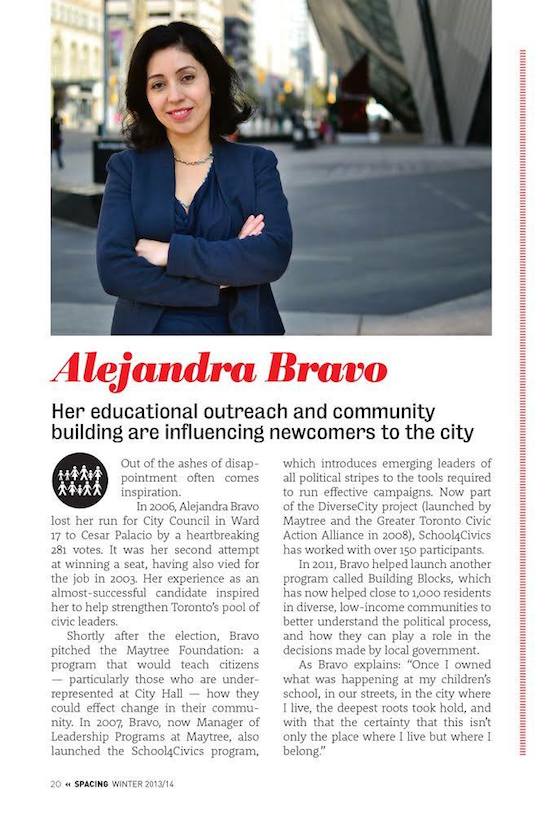
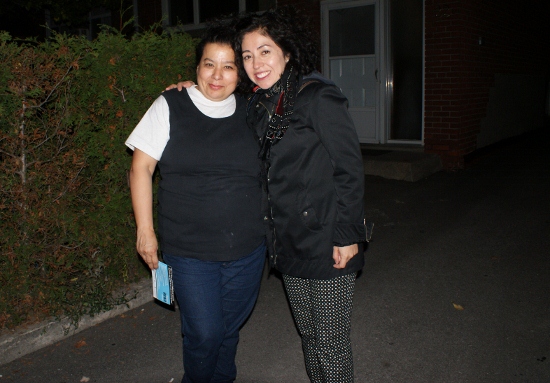
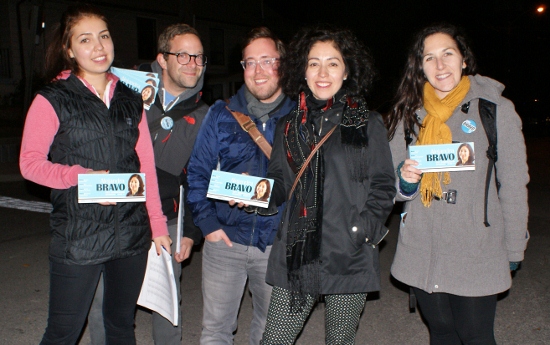
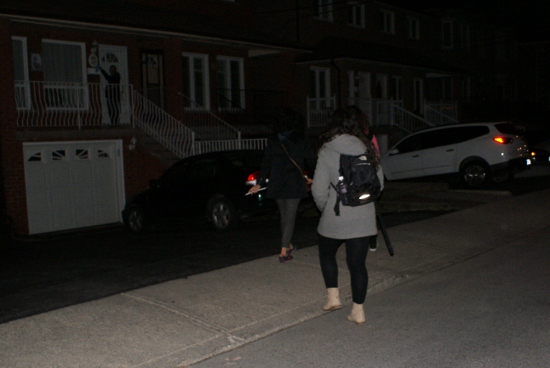

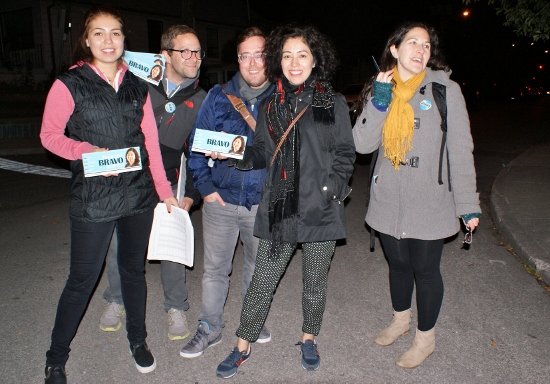
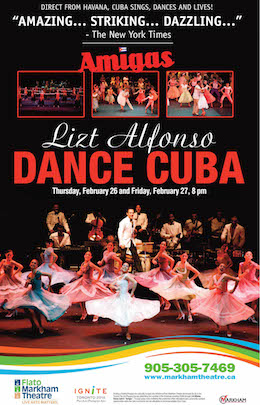


Leave a Reply